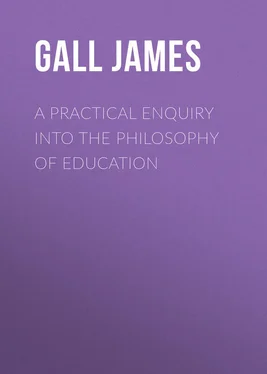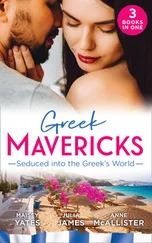James Gall - A Practical Enquiry into the Philosophy of Education
Здесь есть возможность читать онлайн «James Gall - A Practical Enquiry into the Philosophy of Education» — ознакомительный отрывок электронной книги совершенно бесплатно, а после прочтения отрывка купить полную версию. В некоторых случаях можно слушать аудио, скачать через торрент в формате fb2 и присутствует краткое содержание. Жанр: foreign_detective, foreign_antique, foreign_prose, на английском языке. Описание произведения, (предисловие) а так же отзывы посетителей доступны на портале библиотеки ЛибКат.
- Название:A Practical Enquiry into the Philosophy of Education
- Автор:
- Жанр:
- Год:неизвестен
- ISBN:нет данных
- Рейтинг книги:3 / 5. Голосов: 1
-
Избранное:Добавить в избранное
- Отзывы:
-
Ваша оценка:
- 60
- 1
- 2
- 3
- 4
- 5
A Practical Enquiry into the Philosophy of Education: краткое содержание, описание и аннотация
Предлагаем к чтению аннотацию, описание, краткое содержание или предисловие (зависит от того, что написал сам автор книги «A Practical Enquiry into the Philosophy of Education»). Если вы не нашли необходимую информацию о книге — напишите в комментариях, мы постараемся отыскать её.
A Practical Enquiry into the Philosophy of Education — читать онлайн ознакомительный отрывок
Ниже представлен текст книги, разбитый по страницам. Система сохранения места последней прочитанной страницы, позволяет с удобством читать онлайн бесплатно книгу «A Practical Enquiry into the Philosophy of Education», без необходимости каждый раз заново искать на чём Вы остановились. Поставьте закладку, и сможете в любой момент перейти на страницу, на которой закончили чтение.
Интервал:
Закладка:
As "Science" is the investigation and knowledge of principles, so an "art" may be defined as a system of means, in accordance with these principles, for attaining some special end. Teaching is one of the arts; and it depends as entirely for its success upon a right application of the principles of the science of education, as the art of dying does upon the principles of chemistry. As an art, therefore, teaching must be subjected to all those laws which regulate the improvement of the other arts, and without which it can never be successfully carried on, far less perfected. These laws are now very generally understood; and we shall briefly advert to a few of them, which are necessary for our present purpose, and endeavour to point out their relation to the art of teaching.
1. One of the first rules connected with the improvement of the arts is, that the artist have a specific object in view, for the attainment of which all his successive operations are to be combined . – The manufacturer has his cloth in prospect, before he has even purchased the wool of which it is to be composed; and it is the desire of procuring cloth of the most suitable quality, and by the easiest means, that compels him to draw liberally and constantly from the facts ascertained, and the principles developed, by the several sciences. From the science of mechanics he derives the various kinds of machinery used in the progressive stages of its production; and from the science of chemistry he obtains the processes of dying, and printing, and dressing. But he never troubles himself about the science of mechanics or of chemistry in the abstract; he thinks only of his cloth, and of these sciences as means to assist him in procuring it. He is careful of his machinery, and is constantly alive to the mode of its working, and is thus prompted to adopt such improvements as observation or experience may suggest; but it is not the machinery of itself that he either cares for, or thinks about. No; it is still the cloth that he keeps in view; and his machinery is esteemed or slighted, adopted or abandoned, exactly in proportion as it forwards his object. The processes necessary in the different departments of his establishment, are complicated and various, and to a stranger they are both curious and instructive; but it is neither the labour nor the variety that he is seeking. His is a very different object; and of this object he never loses sight; for the varied operations of stapling and carding, of spinning and weaving, are nothing more than means which he employs for accomplishing his end. He knows the uses of the whole complicated operations; and he sees at a glance, and can tell in a moment, how each in its turn contributes to the great object of all, – the production of a good and marketable cloth.
Now this law ought to be applied with the utmost strictness to the art of teaching. For if teaching be really an art, – that is, a successive combination of means, – it should undoubtedly be a combination of means to some specific end. Nothing can be more obvious, than that a man who sits down to work, should know what he intends to do, and how he is to do it. Such a line of conduct should be imperatively demanded of the teacher, both on account of the importance of his work, and of the immense value of the material upon which he is to operate. The end he has in view, whatever that end may be, ought to be correctly defined before he begins; and no exercise should upon any account be prescribed or demanded from his pupils, which does not directly, or indirectly at least, conduce to its attainment. To do otherwise is both injudicious and unjust. For if the operations of the husbandman during spring have to be selected and curtailed with the strictest attention to time and the seasons, how carefully ought the energies and the time of youth to be economized, when they have but one short spring time afforded them, during which they are to sow the seed which shall produce good or evil fruit for eternity? As to what this great end which the teacher ought steadily to contemplate should be, we shall afterwards enquire; at present we are desirous only of establishing this general law in the art of teaching, that there should be an end accurately defined, and constantly kept in view; and for the attainment of which every exercise prescribed in the school should assist. The teacher who does otherwise is travelling in the dark, and compelling labour for labour's sake; – like the manufacturer who would keep all his machinery in motion, not to make cloth, but to appear to be busy.
2. Another law adopted in the successful prosecution of the arts is, to use the best known means for attaining any particular end . – This law is well known in all the other arts, and success invariably depends upon its adoption. The fields are not now tilled by the hoe, nor is cotton spun by the hand. These modes of operating have no doubt the recommendation of antiquity; but here antiquity is always at a discount, and no one doubts the propriety of its being so. The arts are advancing; and they who would impede their progress on the plea of not departing from the usages of antiquity, would be pitied or laughed at.
The art of teaching, like the other arts, depends for its success on a strict adherence to this law; and the fear of departing in this case from the particular usages of our ancestors is equally unreasonable. Soft ground in the valleys compelled them to travel their pack horses right over the hills, and the want of the "Jenny" made them spin their yarn by the hand; but still, the same principle which guided them in the adoption of those methods, was strictly the one which we are here recommending, that of "using the best known means for accomplishing the particular end." Those who adopt the principle do most honour to their sagacity; while their shallow admirers, by abandoning the principle, and clinging to their necessarily imperfect mode of applying it, at once libel their good sense, and dishonour those whom they profess to revere. As society is rapidly advancing, paternal affection would undoubtedly have prompted them to advise their descendants to take the benefits of every advance; – and it would be as reasonable for us to suppose, that if they were now alive, they would advise us to travel over the hills on their old roads, or make our cloth in the old way, as to think they would be gratified by our continuing to use exercises in education, which sound philosophy and experience have shewn to be fallacious and hurtful, or that they would be displeased by the use of those which extensive experiment has now proved to be natural, easy, and efficient.
These ancestral trammels have all been shaken off, wherever the acquisition of money is concerned. The mechanical processes of his forefathers have no charm for the modern manufacturer, when he can attain his object more economically by a recent improvement. Neither does he go blindfold upon a mere chance, – seldom even upon a sagacious conjecture, – unless there be some good grounds for its formation. In every successive stage of his operations, he is awake to the slightest appearance of defect; and he hesitates not a moment in abandoning a lesser good for a greater, whenever he perceives it. He husbands time; – he husbands expense; – he husbands supervision and risk. Every step with him is a step in advance; – every operation has a design; – every movement has a meaning; – and he makes all unite for the attainment of one common object. Can we doubt that, in like manner, the most rigid economy of time and labour ought to be adopted in the art of teaching? When the end has once been distinctly defined, it ought steadily to be kept in view; and no exercise should be prescribed which does not contribute to its attainment. There should be no bustling about nothing; no busy idleness; no fighting against time; no unnecessary labour, nor useless exhaustion of the pupil's energies. The time of youth is so precious, and there is so much to be done during it, that economy here is perhaps of more importance than in any thing else. Every book or exercise, therefore, which has not a palpable tendency to forward the great object designed by education, should by the teacher be at once given up.
Читать дальшеИнтервал:
Закладка:
Похожие книги на «A Practical Enquiry into the Philosophy of Education»
Представляем Вашему вниманию похожие книги на «A Practical Enquiry into the Philosophy of Education» списком для выбора. Мы отобрали схожую по названию и смыслу литературу в надежде предоставить читателям больше вариантов отыскать новые, интересные, ещё непрочитанные произведения.
Обсуждение, отзывы о книге «A Practical Enquiry into the Philosophy of Education» и просто собственные мнения читателей. Оставьте ваши комментарии, напишите, что Вы думаете о произведении, его смысле или главных героях. Укажите что конкретно понравилось, а что нет, и почему Вы так считаете.










